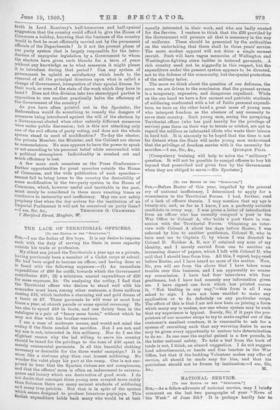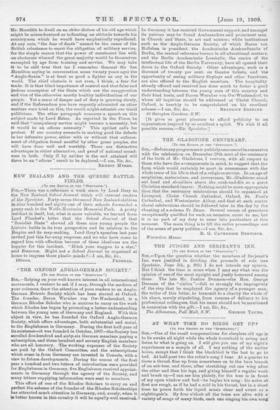NATIONAL SERVICE.
[To Tax EDITOR OP 9HE SPECTATOR."] SIR,—As a fellow-advocate of national service, may I briefly comment on the last two paragraphs of your "News of the Week " of June Sth? It is perhaps hardly fair to Mr. Meredith to dwell on an obiter dictum of his old age which might be misunderstood as indicating an attitude towards his countrymen which he would have emphatically repudiated. At any rate, "the fear of death" cannot he the cause of the British reluctance to enact the obligation of military service, for the simple reason that the power of enactment lies with ,an.electorate whereof the great majority would be themselves exempted by age from training and service. We may take it to be still true that (as I remember General Sir Ian Hamilton saying in conversation some twenty years ago) the "Anglo-Saxon" is at least as good a fighter as any in the world. The chief obstacle is not even, I think, a fear for trade. It is that blind impatience of control and that falee and jealous conception of the State which are the exaggeration and vice of the otherwise mostly healthy individualism of our people. Yet a sense of danger and of duty is growing slowly, and if the Referendum you have cogently advocated on other matters were tried on this, the result might astonish our timid politicians. The other paragraph concerns a speech on this subject made by Lord Esher. As reported in the Times, he said that " compulsory service might become a necessity, but it would be an odious necessity." This epithet calls for protest. If our country succeeds in making good the defects in her defensive power, either with or without that enforce- ment of obligation found needful by other great peoples, she will have done well and worthily. There are distinctive advantages in either alternative, and proof of national sound- ness in both. Only if by neither is the end ,attained will there be an " odious " result to be deplored.—I am, Sir, &C.,
ERNEST MYERS.











































 Previous page
Previous page